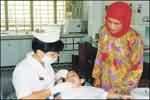Why is good oral health practice important?
Most common oral diseases in young children i.e. tooth decay and gum disease can be prevented through good oral health practice.
What is good oral health practice?
Good oral health practice is focused on 3 main preventive measures.
|
 |
 |
|
|
 |
Conclusion
Start Early, Healthy Mouth for a Healthier Life’
| Last Reviewed | : | 23 August 2019 |
| Writer | : | Dr. Che Noor Aini bt. Che Omar |
| Dr. Sharol Lail Sujak | ||
| Dr. Laila bt. Abdul Jalil | ||
| Reviewer | : | Dr. Sharol Lail bin Sujak |







